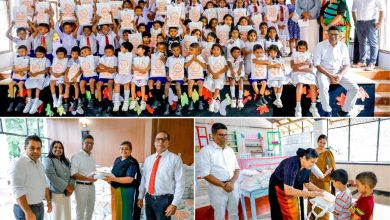LMDtv 4
 Migration has always been a part of human civilisation; but today, it has become a global phenomenon that’s increasing at a pace not seen before. “There’s movement across the globe at a very severe rate,” observed Sanji Caldera, in a recent LMDtv interview.
Migration has always been a part of human civilisation; but today, it has become a global phenomenon that’s increasing at a pace not seen before. “There’s movement across the globe at a very severe rate,” observed Sanji Caldera, in a recent LMDtv interview.
There are many reasons for people to migrate – such as seeking refuge and safety from wards in their countries, desiring better education and career prospects or simply looking for a change of scene.
Sri Lankans have been migrating at an unprecedented rate in the last few years, which Caldera notes is much higher than during the island’s civil war. “We were talking about fearing for one’s life and wanting to relocate to a safe country. Now we’re talking about economic reasons,” the Managing Director and Principal Migration Consultant of Sanji Caldera Associates said, commenting on the intensity of people’s desire to migrate.
Based in Australia, he shared how appealing the nation is to Sri Lankans, explaining that “everybody knows somebody in Australia – relatives or friends. So they have that comfort zone of meeting someone who will offer support. Sri Lankans have always had that in Australia, more than in any other country except Canada perhaps.”
While Sri Lankans migrate to different Australian cities, Melbourne has become the hotspot. “As a city, it’s a huge community. People who migrate no longer have culture shock here. Melbourne has become a melting pot. They are comfortable socially and even in terms of things like food preferences,” he remarked.
The passion for cricket in Australia has also become a social glue connecting Sri Lankans. Caldera noted: “About 35 years ago, Sri Lankans didn’t have an identity for ourselves – we had an identity as Indians because we look like them. Cricket has created a distinction.”
“Australians absolutely love Sri Lankans for many reasons. There is always a preference for Sri Lankans as employees because they’re very hardworking,” he asserted.
Caldera elaborated: “We have this perception that Sri Lankans don’t work hard and are lazy. But they work very hard and there’s ample testimony of how Sri Lankans have established themselves in Australia. There are many entrepreneurs, professionals and tradespeople across the board.”
The education system in Sri Lanka helps too. “Degrees from universities approved by the University Grants Commission (UGC) are recognised as being on a par with Australian qualifications, which enables Sri Lankans to migrate to Australia,” he revealed.
However, he also shared his thoughts on the hidden cost of migration that few people take into account: “It tears families apart – when you migrate, you do so for many years and don’t see your family for a long time.”
There are also the life changing experiences of settling in another country.
In the context of Australia, Caldera outlined: “The Australian social security system doesn’t kick in immediately – it takes time. One needs to come and hit the ground running. So Sri Lankans who come here look for work from day one, staying with family or friends until they’re settled. As soon as a family member secures a full-time job, they can survive independently.”
The transition isn’t too hard to handle, in his view’ but he acknowledged that it may be difficult but “a person who is looking for a job will always find employment.”
People migrate to Australia from across the world and “Sri Lanka, despite being a small country, could be placed at around the sixth or seventh in terms of the volume of people migrating here,” he estimated.
Caldera explained: “This is because of the number of people who are suitable to migrate especially due to the high level of education and literacy of Sri Lankans.”
“Sri Lankans will continue to migrate to Australia but the sheer desperation that has taken hold in the last three years will eventually subside as the country progresses,” he asserted.


